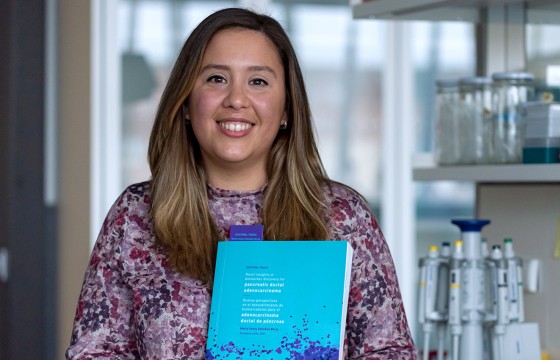
María Iranzu González-Borja will submit her doctoral thesis next Monday, May 23rd
María Iranzu González-Borja, predoctoral researcher at the OncobionaTras Unit of Navarrabiomed-IdiSNA (current Oncobiona), will sit her viva for her doctoral thesis from the Public University of Navarra next Monday, May 23rd at 12:00 pm in the assembly hall of Navarrabiomed.
The doctoral work, which is entitled "Novel insights in biomarker discovery for pancreatic ductal adenocarcinoma”, has been developed at Navarrabiomed under the direction of the Dr. Joaquín Fernández Irigoyen, and Dr. Antonio Viúdez Berral.
Pancreatic ductal adenocarcinoma is considered one of the most aggressive types of cancer, and represents, approximately, 90% of pancreatic tumours. It is the seventh leading cause of cancer-related death worldwide*, with a 5-year survival rate of 10.8%, largely due to its late diagnosis. Therefore, it is essential to identify new biomarkers that allow, on the one hand, early diagnosis of the disease and, on the other, to predict the response of these patients to different types of treatment in order to improve their prognosis.
This doctoral thesis is part of a multicentre study led by the University Hospital of Navarra (HUN), in which the hospitals La Paz, Marqués de Valdecilla, Miguel Servet and Reina Sofía have also participated. A total of 64 patients and 22 age and sex-matched healthy subjects. The research can be divided into 4 types of study: specific proteins present in serum (cytokines and growth factors); immunological cell populations present in blood and tumour tissue; differential proteomics studies in serum; and the study of the methylation of the CHFR gene promoter. The results obtained show that the use of serum levels of certain cytokines can help in the early diagnosis of pancreatic adenocarcinoma, as well as predict the evolution of patients and their response to the different available treatments. Findings further show that the use of the levels of immune cell populations, in combination with the levels of CHFR gene expression in the tumour, can also help to identify those patients with a poorer prognosis.
Financing and disclosure
The work carried out has led to several scientific publications. Among them, “Omics Approaches in Pancreatic Adenocarcinoma”, published in Cancers, and “Deciphering CHFR Role in Pancreatic Ductal Adenocarcinoma”, published in Frontiers in Medicine-Gastroenterology.
In addition, it has been disseminated in several national and international congresses, such as the Spanish Society of Medical Oncology, the European Society for Medical Oncology and the American Society of Clinical Oncology ASCO- Hub.
For the development of the thesis, María Iranzu González has received several grants for the recruitment of doctoral students by companies and research and knowledge dissemination organizations: industrial doctoral students 2018-2020, Grants awarded by the Government of Navarra for the completion of doctoral theses, Grants for the Mobility of doctoral students from the Public University of Navarra (2018) for the completion of a stay at the Centre for Molecular Biology and Regenerative Medicine (CABIMER) in Seville, Grants for the International Mobility of doctoral students from the Public University of Navarra (2019 ) for the completion of an international stay at the Precision Medicine Centre of Excellence (PMC) at Queens University (Belfast-Northern Ireland), and a scholarship to attend the European Pancreatic Club 51st Congress in Bergen (Norway).
*1. Rawla P, Sunkara T, Gaduputi V. Epidemiology of Pancreatic Cancer: Global Trends, Etiology and Risk Factors. World J Oncol. 2019;10(1):10-27.
2. Bray F, Ferlay J, Soerjomataram I, Siegel RL, Torre LA, Jemal A. Global cancer statistics 2018: GLOBOCAN estimates of incidence and mortality worldwide for 36 cancers in 185 countries. CA Cancer J Clin. 2018;68(6):394-424.


